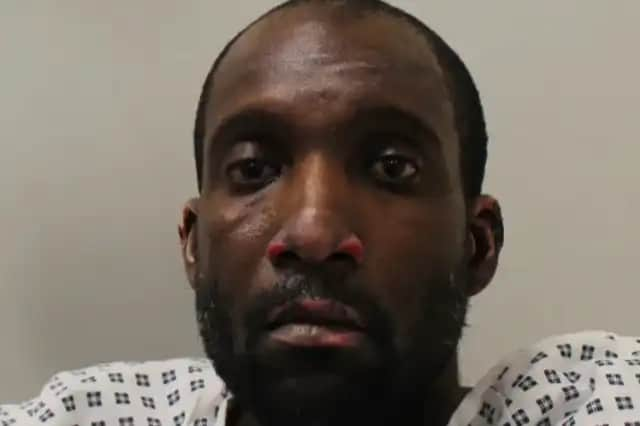Met Police officer ‘failed to investigate’ abusive husband who burnt wife to death, misconduct hearing told
and live on Freeview channel 276
A Met Police officer cancelled an interview with a domestic violence suspect three times before he went on to murder his estranged wife in an arson attack, a tribunal has been told.
Teaching assistant Denise Keane-Barnett, 36, was killed by the fire set by her husband Damion Simmons, now 46, after he doused her home in Stonebridge, Harlesden, northwest London, in petrol on April 16, 2020.
Advertisement
Hide AdAdvertisement
Hide AdSimmons, who was subsequently convicted of murder and arson at an Old Bailey trial and is now serving at least 32 years of a life sentence, had been reported to police by his wife for a campaign of harassment and domestic abuse on multiple occasions prior to her death, the panel was told.


He even left her threatening voicemails, which were played to the tribunal, calling her a “monster” and stating: “You will suffer.... you treat me like a dog.”
Now PC Sandeep Khunkhun, who was made the officer in charge of Ms Keane-Barnett’s case, is facing allegations of gross misconduct at a tribunal, for failing to “adequately investigate the offences reported”.
She denies the allegations.
Ms Keane-Barnett and relatives told officers her husband, who moved to the UK from Trinidad in December 2019, had grabbed her, caused arguments, locked her in her room, stolen a gold chain belonging to her dead mother, and posted abusive messages about her online, panellists were told.
Advertisement
Hide AdAdvertisement
Hide AdThe hearing was told Simmons also sent emails and social media posts about his wife, who was the niece of Electric Avenue singer Eddy Grant, including "false information about me, saying I’m crazy, I’m not in my right mind," she told police.
She added: "In the messages he was accusing me of having a bisexual affair with a friend."
The panel heard Simmons threatened to share allegations with Ms Keane-Barnett’s workplace, knowing she worked in a school.
The tribunal was told she reported him to the police for installing a lightbulb camera in her bedroom to spy on her, and had begun divorce proceedings, changed her phone number and was trying to obtain a non-molestation order.


Advertisement
Hide AdAdvertisement
Hide AdFollowing his conviction, Simmons was also sentenced to 20 years imprisonment for arson with intent to endanger life and 12 months imprisonment for disclosing sexual images, after admitted he shared intimate photos of his wife.
A tribunal at the International Dispute Resolution Centre, in St Paul’s, central London, opened today (Thursday, April 21) and heard how PC Khunkhun repeatedly cancelled interviews with Simmons in early 2020, citing concerns about coronavirus risks.
She was instructed by her superior officer, Det Sgt Tom Lynch, to complete a plan of action, including arresting and interviewing Simmons, examining the lightbulb camera, which was in police custody at Wembley station, contacting the victim and seizing the suspect’s phone.
Lawyer Hywel Jenkins, for the Met, told the panel, led by Cameron Brown QC, the officer “did not arrange for the arrest of Simmons for harassment or voyeurism, notwithstanding the numerous complaints... did not interview Simmons... three times cancelled each appointment and did not set a further interview date”.
Advertisement
Hide AdAdvertisement
Hide AdIn one text message to Simmons, the panel heard, PC Khunkhun wrote: “Hi, I’m sorry I will have to cancel tomorrow. Do you have any signs of Covid-19?”
Mr Jenkins continued: “You did not seize Simmons’ devices.
“The downloading of his mobile phone would have revealed a chat string relating to the lightbulb camera [and] text messages relating to the lightbulb camera.
“You did not take any witness statements. You did not examine the lightbulb... you did not take into account reports of further harassment.”


But, Mr Jenkins said, she later recommended the closure of crime reports on April 6 - just 10 days before the arson attack.
Advertisement
Hide AdAdvertisement
Hide AdShe then assured a superior officer the action plan had been followed, when it had not.
“When he asked if Det Sgt Lynch’s action plan had been fulfilled, PC Khunkhun assured him that it had,” he said.
“That was a very serious matter indeed... very little if any of that plan had been fulfilled.
“Nothing was recorded [on the crime reports] between February 21 and March 15.
“She said she had done everything asked of her.”
Advertisement
Hide AdAdvertisement
Hide AdThe panel heard she had considered Ms Keane-Barnett to be in an “on-off relationship” with Simmons, which she did not believe would “stand up in court as harassment” and claimed the victim had said she was not supportive of prosecution.


“You did not believe Ms Keane-Barnett was vulnerable or in a position where she was threatened,” Mr Jenkins said.
PC Khunkhun also claimed an entry on a crime record stating that Ms Keane-Barnett would support a prosecution of her husband was “erroneous”, the panel heard.
Mr Jenkins said: “There was no evidence that this was an on-off relationship.”
He continued: “You failed to safeguard Ms Keane-Barnett.
Advertisement
Hide AdAdvertisement
Hide Ad“Your failings constituted a serious departure from the Policing College regulations [and] amount to gross misconduct, namely in respect of duties and responsibilities and honesty and integrity.
“The safeguarding, we submit, was completely overlooked.
“This lady was really left to her own devices, at risk and unfortunately on the night of April 16, Simmons took advantage of that.”
PC Khunkhun, represented by defence lawyer Ailsa Williamson, is expected to give her evidence to the panel, which also includes Det Supt Helen Williams, from the Met, next week, on Monday, April 25, or Tuesday, April 26.
If allegations against her are proven, she faces losing her job with the Met and being unable to work in policing anywhere in the UK.
The hearing continues.
